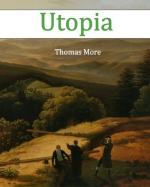|
|
Utopia Objects/Places
New Castile: The place where Raphael's journey began.
Gold/treasure: These have no value in Utopia. However, they are accumulated from exports so that the Prince may hire armies in war.
Family: Consists of about forty people, who live together, and share a trade. There are a minimum of ten people in each family, and the son typically learns from the father and takes up his trade. Should he have an affinity for something else, he may join another family. The oldest able-minded man looks after the family, and is called the governor of the family. It is the wives' duty to serve their husbands, the children's duties to serve their parents
City: Citizens are tenants in cities, which are almost all identical, and at least twenty miles long. Each city is divided into four sections, each with its own marketplace where the fathers go and take what they need from others, and supply in turn what they have produced. Also, good deeds are made reference to in marketplaces, as statues, erected in honor of the deeds, are placed there.
Workday: The workday in Utopia is only six hours. This is because Utopians strongly believe in developing the mind, and give people time to do so. Since everybody works, including women and children, they can produce enough to be almost self-sufficient.
Utopia: Utopia means perfect society, and this is what Raphael is describing in this book--the perfect country that he visited. There is no greed, selfishness, brutality, and very little crime. Furthermore, nobody is unhappy.
Passport: This is necessary in order to travel. It is obtained from the Prince and is a permit to travel to certain places, for a certain period of time. If somebody is caught traveling without this, they are punished.
Clothing: Clothing in Utopia is very bland and durable. People do not wear fine cloths, but instead leather, to work. Clothing is of no importance, and does not signify importance or anything of the like. At festivals, everybody, except the priests, wear white. The fashion never changes, and is based on practicality.
Religion: Utopia practices freedom of religion. However, the law states that everybody must believe in a Divine Being, and that everybody must believe that the human soul lives after death. Also, no one is to disrespect anybody else's religion.
Slavery: Prisoners of war who fought in battle are made slaves. Also, slavery is part of the punishment for certain crimes. Citizens of poor neighboring countries also offer themselves as slaves, though they are to be treated better than regular slaves and they are free to leave whenever they please.
Money: This does not exist in Utopia, as people are free to take whatever they want and supply what they make/produce for no charge.
Amaurot: The capital of Utopia, Amaurot is the most eminent town, as it is where the supreme council resides. Amaurot is located on the side of a hill, and a river, Anider, runs by it. Anider runs down to the ocean, and is fortified at its source so that enemies are not able to poison or redirect the water, for the town depends on this river for water supply. A wall with many towers and forts surrounds Amaurot. The wall is also surrounded on three of four sides by a ditch, and by a river on the fourth side. All the houses inside Amaurot are identical. This is also the place where the annual meeting of counselors, at which they decide the needs and surpluses of each city, takes place.
Governor: This is the oldest able-minded man in the family. His duty is to advise people in the family and take care of the family.
Pleasure: Pleasure can only be found in things that are virtuous. Pleasure is to be sought after, but at no other person's cost. There are several types of pleasure--those of the body, such as eating (and the greatest of which is health), and those of the mind, which are considered the greatest pleasures of all.
Death: Death is not to be feared. People should long to die, in order to meet their maker. People who are dying and are angry about it are thrown in a ditch when dead, and not given a proper funeral.
Laws: There are few laws in Utopia, and no lawyers, as each person defends himself or herself. All laws are made in order for each person to know their duty.
War: Utopians do not like war, however they do engage in it when necessary. It is considered necessary when they are defending themselves, their neighbors, or their friends, and when a Utopian has been injured or killed by a citizen of another country who will not give himself or herself up.




